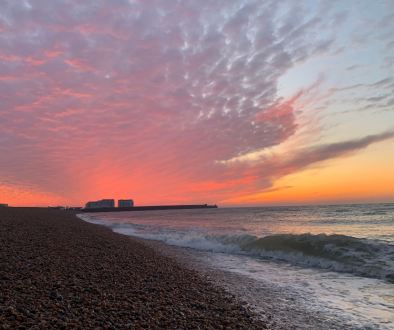The answer to that title is: everywhere
Psalm 139 is one of my favourite psalms and I remember it being read so profoundly and beautifully by Nicky’s godfather Roger at Nicky and Ed’s wedding. In it we are reassured that there is absolutely nowhere that we could be where God is not.
“Where can I go from your Spirit? Where can I flee from your presence?If I go up to the heavens, you are there; if I make my bed in the depths, you are there.If I rise on the wings of the dawn, if I settle on the far side of the sea,even there your hand will guide me, your right hand will hold me fast.If I say, “Surely the darkness will hide me and the light become night around me,”even the darkness will not be dark to you; the night will shine like the day, for darkness is as light to you.” (Psalm 139:7-12).
On my first Christmas as a vicar Christmas Day was on a Saturday so the first Sunday after Christmas was Boxing Day. The gospel reading for St Stephen’s day is the harrowing account of king Herod killing all the baby boys in Judea born around the time of Jesus: aptly called “the slaughter of the innocents”. Jesus family were forced to flee to Egypt to escape the infanticide.
To add to the atmosphere on this Boxing Day, we had no heating in church because ours was being replaced and the hired in industrial blow heaters had run out of gas. So I could see the breath vapour condensing in the cold from the hardy souls that were in the congregation as I got up to speak with my coat off in an attempt at looking warm!
But as I spoke on the gospel for that day, I found myself inspired by the theme “where God is” and by the surprisingly full church given that everyone had been here the day before and that it was about ten degrees colder than then.
My points were as follows, which I find helpful today as I sit in my wheelchair feeling like that day was a lifetime ago.
Where God is:
Where you ARE not where you wish you were
Mary and Joseph wanted to be at home in Nazareth, not hiding out in a foreign country. I’m reminded that we often feel like all immigrants to this country want to be here to take advantage of the benefits of living here in employment education and health, but I wonder how many dream of home and what might have been but for warfare, corruption or slavery trafficking.
God is right there in Egypt with Mary and Joseph. In person. Emmanuel: God with us. Not in theory. In person. Jesus.
Of course, it would not have felt like that at all. Jesus was a vulnerable baby, dependent on his parents for everything. But in this life that Mary and Joseph were bringing up, God was saving the world from everything that they and we fear: hardship, violence and even death itself.
I think we all face the choice, in our different ways, like Mary and Joseph: are we willing to believe that God is with us as we are and where we are: in sickness or in health, in poverty or wealth, with a home or without one, happy and content or sad and fearful. Not only that but God is able to work through the sinful actions of others, and even ourselves, that have brought us to places that we don’t want to be.
Where God is:
In the silence
We hear very little about Jesus’ childhood. But that certainly doesn’t mean God is absent. I am reminded of the account of Elijah when he felt exhausted and quite frankly “at the end of his tether” (something I find myself feeling most days at the moment I’m ashamed to say).
“a great and powerful wind tore the mountains apart and shattered the rocks before the Lord, but the Lord was not in the wind. After the wind there was an earthquake, but the Lord was not in the earthquake. After the earthquake came a fire, but the Lord was not in the fire. And after the fire came a gentle whisper. When Elijah heard it, he pulled his cloak over his face and went out and stood at the mouth of the cave.” (1 Kings 19:11-13)
If I’m honest, I don’t think that I have ever heard God in any dramatic ways. But in my teens through to my mid thirties, I sensed his presence in ways that left me in no doubt about his favour and good purposes for my life and that of the whole world. I was spurred on to get ordained and to give my life to him in any way I could. Nothing has changed. Except that the last ten years have been marked by personal failure and illness. I don’t experience God in ways that are tangible to me. Does that mean that God has abandoned me? Sometimes I am tempted to think so. But other times, when I let the silence surround me like a cloak (rather than block it out with the tv in my anxiety to feel ‘presence’ however artificial and unsatisfying), I know that God is in the silence. Not in any way that ‘explains’ how he is working his purposes out in my life that feels like a failure to blossom and be what he made me for. But in a way that invites me to come to him just as I am and let that be enough. Because he is enough.
I love how psalm 139 appears to just go full circle.
Beginning:
“You have searched me, Lord, and you know me.You know when I sit and when I rise; you perceive my thoughts from afar.You discern my going out and my lying down; you are familiar with all my ways.”
Ending:
“Search me, God, and know my heart; test me and know my anxious thoughts.See if there is any offensive way in me, and lead me in the way everlasting.”
And yet there’s a big difference in that at the beginning there’s an acknowledgment that God knows our thoughts, our hearts – he’s familiar with all our ways. But by the end, after the psalmist has reflected on God’s presence, sovereignty, goodness and love, he says to God “search me, know me, lead me”.
At the beginning the psalmist rests in the knowledge that he is secure in God’s hands, but at the end he places his hand in God’s and says “lead me home” (“lead me in the way everlasting”, lead me into eternity). That is my prayer in the silence of this season of my life. I believe God is present, not to explain or empower in ways that I would wish, but to take me by the hand if I will let him and show me a power that is “made perfect in weakness”.
Where God is:
In the ordinary
My final point on that cold Boxing Day morning was that we often look to find God in the extraordinary because of course God transcends everything we know – he created everything we know out of nothing and he holds everything we know in being. So we can look to God for miracles and extraordinary things. My point was that Jesus and his disciples after him did miracles and extraordinary things in very ordinary situations of daily life: sickness, broken relationships, hunger, guilt and shame, as well as celebrations, homes and workplaces.
So we should look for God in the very ordinary bits of our lives like our work, our family like and friendships, our laughter and joy, our tears and sadness, our rest, and even our sleep!
I played the congregation this song that speaks of this reality and is like a prayer.
I ended with a saying from Mother Teresa, which sums up this point that God is in the ordinary things of life making them extraordinary:
“We can do no great things,
only small things with great love”



